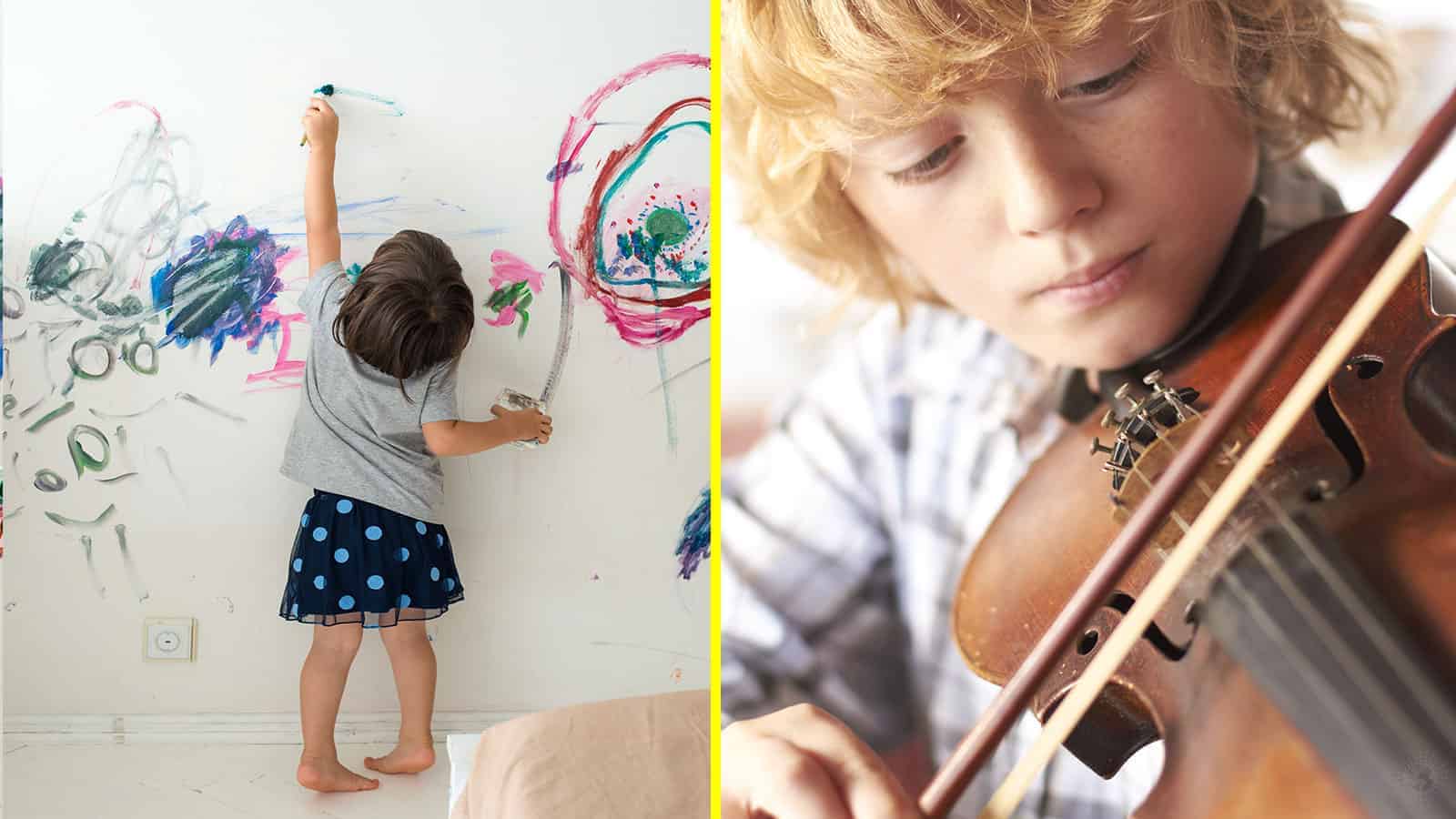When your baby is born, you may find yourself wondering who they will be one day. You’ll be curious about their interests, talents, future career, and many other aspects of life.
While you may have to wait to find out about many of those things, you can begin to learn about your child’s natural talents from the time they first start playing.
Children begin developing talents early on, and no two children are the same. It has become widely known that children thrive in different ways, and much of that has to do with their natural talents. There are things you can watch for and other habits you can form that will help reveal your child’s innate abilities.
The habits are easy to implement and will help your child become the person they were meant to be. From the time they can move and play, you can begin to learn about your child’s talents. Later on, you can learn to foster these talents by following some crucial habits that will help them along the way.
Habits That Reveal Your Child’s Natural Talent
1. Watch them play.
Look for what they generally gravitate for. If they prefer group activities or to play on their own, those are habits that may reveal something about their talents. Other play tendencies to watch for are whether they play sitting quietly or by running around. You should also take note of what he chooses first if there are options to write or draw, play on an electronic, do physical activity, or any other type of interest.
2. Give them choices.
If you want your child to explore sports, let them choose which games they want to try instead of choosing one for them. The same goes for music classes or any other types of activities.
Allow your child to choose from real choices like playing the drums, guitar, singing, or piano. If they want a piano, consider to rent a piano first to test out if their choice is suitable before buying a new one.
When it comes to sports, allow them to explore whichever game they want. The same with art classes where they can choose between painting, sculpting or sketching. For sketching, if you want to compete in the creative market you need brushes like the ones at imagerestorationcenter to level up your artwork!
3. Allow them to explore their talents while validating their interests comfortably.
Even if you don’t understand their interests, you should always validate them. A kid who likes to play video games, for instance, may be interested in graphics, animation, problem-solving, or storytelling. While you should still limit screen time, allow your child a fair amount of playtime to explore and develop their talents.
Validate these talents by telling your child that they’re good at certain parts (be specific). These comments will make a huge difference and leave a lasting impression.
4. Offer enrichment in their areas of interest.
If they are into a specific sport, take them to see that sport being played. Likewise, if they are into playing a jazz instrument, take them to see a jazz concert. Think about whatever interests they have or activities they seem to be talented in and take them to related events.
Doing this offers enrichment for them, further engraining the talents in their mind. This helps them enjoy it more and further understand the activity.
 5. Don’t push them to do something they don’t enjoy.
5. Don’t push them to do something they don’t enjoy.
Even if your child is good at something, they should never be pushed if the child doesn’t enjoy it. Talents and hobbies should be something that a child can enjoy and look forward to. Being good at an activity doesn’t mean anything if they are miserable while doing it.
Pushing a child to do something they don’t enjoy also takes away from the activities that they do enjoy. Allow your child to spend time finding the activities that they are good at and enjoy thoroughly.
To know for sure that your child likes the activity, look for the following:
- They ask questions about the activity
- A desire to talk about it
- The child has fun and is in a good mood afterward
- They want to do it again, and not just because they are expected to
6. Communicate positively.
When communicating positively, it’s about more than just saying encouraging things. Yes, you should be asking questions, praising your child for a job well done, and showing interest and excitement in what your child is working on. However, you should also avoid being overbearing.
Being overbearing in these times can cause your child to lose interest or motivation. The pressure becomes too much, and they may begin feeling forced. You have to let your child know that this talent they are pursuing is their choice while also showing excitement and support.
7. Make sure your child has time to socialize.
Socialization is vital among children for many reasons but, when it comes to this topic, the goal is a little different. When exploring talents, children need to discuss with their peers what they like to do and what they are learning. Giving them this chance allows them to express why and how they love a particular activity, and it helps confirm for the child that this is something they want to continue pursuing.
This isn’t to get the opinion from friends when it comes to what a child likes to do. Rather it affirms for the child that they chose something they love. Talking it out with their friends or other children, their age allows them to further understand their talent personally.
8. Consider competitions.
If your child is comfortable with it, enter them in a competition. This allows them to decide if the activity is cut out for them, and it gives them insight as to which areas they need to improve in.
During the competition, don’t nag your child or overwhelm them with advice. Only give them positive support and encouragement. If it is the child’s first competition, remember to consider that when determining how to support your child and whether or not they should enter another competition.
9. Teach your child to work hard.
You won’t ever know what talents your child holds if you don’t teach them to work hard. Children need to practice and work on constant improvement, even when it is an activity they are talented at. Foster those talents you believe your child has by teaching them to work hard.
This will come in especially handy during competitions and opportunities for improvement. Remember never to push too hard and to ensure your child has socialization, educational, and relaxation opportunities, however.
10. Always let the final decision be left up to the child.
Of course, if there are safety concerns, you should always put an end to it. If there are no concerns, however, all decisions pertaining to the activity should be left to the child. This ensures they don’t begin to feel pressured or burnt out, and it allows them to know they can say no if they don’t want to do something.
If a child feels pressured or burnt out, they may begin to dread the activity they once loved. If you genuinely want to help them reveal any natural talent, it is essential to let them take the lead.
What Not To Do When Revealing Your Child’s Natural Talent
- Force the child to do something they aren’t comfortable with or aren’t enjoying
- Push for competition when they don’t feel ready.
- Encourage anything that may be dangerous or harmful.
- Push them into doing too many activities at the same time.
- Compare your child to other children or pointing out how someone else is more ready than they are.
- Be pessimistic about their progress, their future in a particular activity, or even in a way that makes them think they can’t be what you want them to be.
- Allow the child to participate when they are ill or overly anxious.
- Place labels on your child based on aptitudes.
Why It’s Important to Reveal Your Child’s Natural Talent
Children will never know their options when choosing hobbies and activities to pursue if they were never helped along the way. By offering different options and encouraging them to continue learning and trying hard, you’ll be helping them determine choices for the rest of their life.
These tips will help them see who they were meant to be and what they can spend their life being passionate about. Not only will you be helping them discover what activities are essential to them and what their natural talents are, but you’ll also be helping them build confidence and self-esteem.
 Final Thoughts On Habits That Reveal Your Child’s Natural Talent
Final Thoughts On Habits That Reveal Your Child’s Natural Talent
Helping to reveal your child’s natural talent is crucial for them from the beginning. They will be protected from being pressured into something they aren’t genuinely talented at or even interested in, and it will help them discover what they may want to pursue during their lifetime.
These simple habits can change the course of your child’s life for the better. By following these habits, you’ll be taking much of the guesswork out of their talents and interests later on.


















